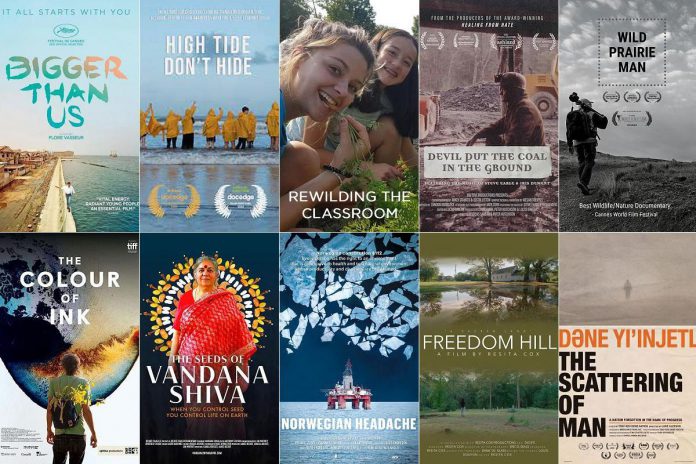
This year’s ReFrame Film Festival will take place between January 26th and February 3rd with a slate of provocative films set around themes of social and environmental justice.
Previous attendees of the ReFrame Film Festival will know that many themes presented at the festival are timely and urgent, pulling at the heartstrings of documentary fans and new-to-film viewers alike.
ReFrame hopes to “light up the darkest time of the year with inspiring activist stories, fascinating trips across the world, incredible images and thought-provoking discussion.” Interested individuals can now access the full lineup of films using ReFrame’s interactive film guide at reframefilmfestival.ca/film-guide/.
The festival will open with an in-person screening of All the Beauty and the Bloodshed by Laura Poitras at Showplace Performance Centre on Thursday, January 26th at 7 p.m.
The majority of film screenings will be held virtually, with in-person festival events including the opening night, Q&As, panel discussions, and an exhibition at Artspace.
GreenUP sees the urgent importance of climate action reflected in the many environmentally themed films featured at ReFrame this year. Read on to learn more about 10 must-see films from near and far which will be featured in the 2023 lineup.
VIDEO: “Bigger Than Us” trailer
Films at the festival this year highlight youth voices and stories.
Bigger Than Us by Flore Vasseur features 18-year-old Melati, a young Indonesian woman who works towards tackling the plastic pollution issue that is impacting her country. Sometimes risking their lives and safety, the youth in this film passionately and courageously protect people, the climate, and access to education and food.
Organizing climate movements as a young person has a steep learning curve. High Tide Don’t Hide, filmed in New Zealand and directed by Niva Kay, Emily McDowell, Nia Phipps and Phil Stebbing, follows the struggle of young people empowering themselves to take climate action in their communities.
The shorts program “Confronting the Climate Crisis” features four films that show people and places impacted by changes in the environment. A standout film in this program, Rewilding the Classroom, looks at the Youth Leadership in Sustainability program developed by local educator Cam Douglas. In the film, we learn about youth as they explore the reality of environmental crises in Nogojiwanong/Peterborough.
One of the pertinent issues the festival hopes to highlight this year is the opioid crisis, a challenge we may not immediately think of when taking action for the environment.
Devil Put the Coal in the Ground, directed by Peter Hutchison and Lucas Sabean, shows that the overdose crises and the environment are interconnected. Uniquely structured upon the personal storytelling of West Virginians, this film is a meditation on the suffering brought on by the coal industry and its decline.
VIDEO: “Devil Put the Coal in the Ground” trailer
Environmental documentaries at ReFrame also touch on stories of hope and inspiration. These next two films are light-hearted and inspirational.
George Tsougrianis’ Wild Prairie Man is an intimate look at the life of a man enthralled with the endangered ecosystem of Grasslands National Park. Located in the Northern Great Plains of Canada, capturing the beauty of the Grasslands has been a 20-year odyssey for wildlife photographer James R. Page.
As well, try The Colour of Ink by Brian Johnson, which uncovers the mystery of an old art medium through the eyes of Toronto inkmaker Jason Logan. Harvesting colours from the natural world — weeds, berries, bark, flowers, rocks, rust — Logan makes ink from just about anything.
Environmental films highlight the interactions between people and the environment, reminding the audience that we are connected with nature, no matter where we are.
The Seeds of Vandana Shiva, a feature-length documentary directed by Jim Becket and Camilla Becket, presents the remarkable life story of the Gandhian eco-activist and agro-ecologist Vandana Shiva. A classic David versus Goliath tale, the film shows how Vandana, a brilliant scientist, became a star of the international organic food movement.
Premiering in Canada for the first time is Norwegian Headache by Rune Denstad Langlo. This film looks at how Norwegian government decision-making can be the difference between environmental protection or environmental detriment. It follows the precedent-setting legal battle of Article 112 of the Norwegian Constitution, which speaks to the right for future generations to have a clean environment.
VIDEO: “The Seeds of Vandana Shiva” trailer
ReFrame also features documentaries that address environmental racism and advocacy for Indigenous communities.
Resita Cox’s Freedom Hill connects the dots between climate change, race, and poverty in a film that highlights the historically significant town of Princeville, North Carolina. As a result of racism, a black community has settled in the flood plain that is now Freedom Hill. This community will be directly impacted by increased extreme weather events and is a strong example of how marginalized communities are disproportionately impacted by climate change.
The perspective of the Tsay Keh Dene First Nation is shared in Luke Gleeson’s The Scattering of Man – DƏNE YI’INJET. This community suffers from the environmental, cultural, and social repercussions of the W.A.C Bennett Dam being built on Peace River in the Rocky Mountain Trench, territory that has been inhabited by Tsay Keh Dene for millennia.
“ReFrame is excited to present the stories of people and communities fighting for environmental justice at the local, national, and global levels,” says ReFrame Creative Director Amy Siegel. “We hope these films will incite audiences beyond the festival. We are facing a climate emergency, and I believe film and art can play a part in informing, inspiring, and galvanizing the community to take action.”
GreenUP is once again excited to be a sponsor supporting the ReFrame Film Festival. Audiences can purchase ticket packs of 5, 8, or 10, or a virtual festival pass for those who want to take in all the films. Pay-what-you-can standalone tickets are also available for every film. Opening night tickets are sold separately.
Purchase your ReFrame passes or tickets at reframefilmfestival.ca/festival/passes-tickets/
VIDEO: “Freedom Hill” trailer


























